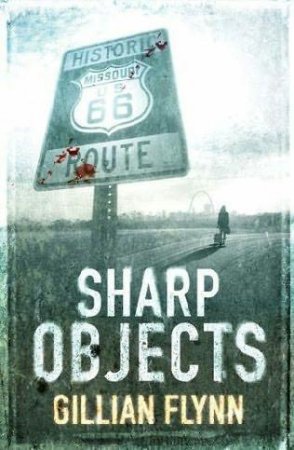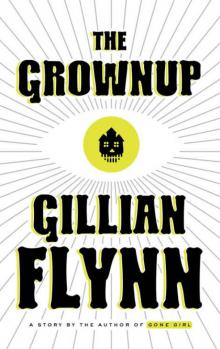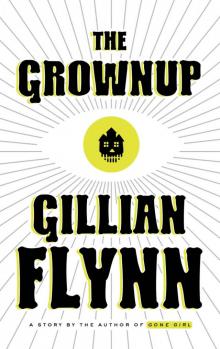- Home
- Gillian Flynn
Dark Places Page 2
Dark Places Read online
Page 2
But the shoe boxes of donations were gone, and I was left with a mere three letters and the rest of the night to kill. I headed back home, several cars blinking their headlights at me until I realized I was driving dark. Kansas City’s skyline glimmered to the east, a modest, mid-rise Monopoly scatter, radio towers spiking here and there. I tried to picture things I could do for money. Things that grown-ups did. I imagined myself in a nurse’s cap, holding a thermometer; then in a snug blue cop’s uniform, escorting a child across the street; then wearing pearls and a floral apron, getting dinner ready for my hubby. That’s how screwed up you are, I thought. Your idea of adulthood still comes from picturebooks. And even as I was thinking it, I saw myself writing ABCs on a chalkboard in front of bright-eyed first graders.
I tried to come up with realistic occupations—something with computers. Data entry, wasn’t that some sort of job? Customer service, maybe? I’d seen a movie once where a woman walked dogs for a living, dressed in overalls and sweater sets and always holding flowers, the dogs slobbery and loving. I didn’t like dogs, though, they scared me. I finally thought, of course, about farming. Our family had been farmers for a century, right down to my mom, until Ben killed her off. Then the farm got sold.
I wouldn’t know how to farm anyway. I have memories of the place: Ben mucking through the cold spring mud, swatting calves out of his way; my mom’s rough hands digging into the cherry-colored pellets that would blossom into milo; the squeals of Michelle and Debby jumping on haybales in the barn. “It itches!” Debby would always complain, and then jump in again. I can never dwell in these thoughts. I’ve labeled the memories as if they were a particularly dangerous region: Darkplace. Linger too long in an image of my mom trying to jury-rig the blasted coffeemaker again or of Michelle dancing around in her jersey nightgown, tube socks pulled up to her knees, and my mind would jerk into Darkplace. Maniacal smears of bright red sound in the night. That inevitable, rhythmic axe, moving as mechanically as if it were chopping wood. Shotgun blasts in a small hallway. The panicked, jaybird cries of my mother, still trying to save her kids with half her head gone.
What does an administrative assistant do? I wondered.
I pulled up to my house, stepped onto a slab of sidewalk where someone had scraped “Jimmy Loves Tina” in the concrete decades ago. Sometimes I had flashes of how the couple turned out: He was a minor-league baseball player/she was a housewife in Pittsburgh, battling cancer. He was a divorced fireman/she was a lawyer who drowned off the Gulf Coast last year. She was a teacher/he dropped dead of an aneurysm at twenty. It was a good, if gruesome, mind game. I had a habit of killing off at least one of them.
I looked up at my rented house, wondered if the roof was lopsided. If the whole thing crashed in, I wouldn’t lose much. I owned nothing of value but a very old cat named Buck who tolerated me. As I hit the soggy, bowed steps, his resentful mews reached me from inside the house and I realized I hadn’t fed him today. I opened the door and the ancient cat moved toward me, slow and crimped, like a jalopy with a busted wheel. I didn’t have any cat food left—that had been on the to-do list for a week—so I went to the fridge, pulled out some slices of hardened Swiss cheese, and gave those to him. Then I sat down to open my three envelopes, my fingers smelling like sour milk.
I never made it past the first letter.
Dear Ms. Day,
I hope this letter reaches you, as you seem to have no website. I have read about you and followed your story closely over the years, and am very interested to hear how you are doing and what you are up to these days. Do you ever do appearances? I belong to a group that would pay you $500 just to show up. Please contact me and I will happily give you more information.
Warmly,
Lyle Wirth
PS This is a legitimate business offer.
Stripping? Porn? Back when the book came out, with its section of Baby Day Grows Up photos, the most notable was me at seventeen, my wobbly, woman-breasts barely held in by a white-trash halter top. I’d received several propositions from fringe nudie mags as a result, none of them offering enough money to make me think hard. Even now five hundred wouldn’t quite do it, if these guys did want me to get naked. But maybe—think positive, Baby Day!—maybe it really was a legit offer, another of those mourners’ groups, needing me to show up so they had a reason to talk about themselves. Five hundred for a few hours of sympathy was a doable exchange.
The letter was typed, except for a phone number that had been inked at the bottom in assertive script. I dialed the number, hoping for voicemail. Instead, a cavernous pause came on the line, a phone picked up, but not spoken into. I felt awkward, as if I’d called someone in the middle of a party I wasn’t supposed to know about.
Three seconds, then a male voice: “Hello?”
“Hi. Is this Lyle Wirth?” Buck was nosing around my legs, anxious for more food.
“Who’s this?” Still in the background: a big loud nothing. Like he was at the bottom of a pit.
“This is Libby Day. You wrote me.”
“Ohhhhh holy cow. Really? Libby Day. Uh, where are you? Are you in town?”
“Which town?”
The man—or boy, he sounded young—yelled something at someone back behind him that included the phrase, “I already did them,” and then groaned into my ear.
“You in Kansas City? You live in Kansas City, right? Libby?”
I was about to hang up, but the guy started yelling hel-ooo-o? hel-ooo-o? into the line, like I was some dazed kid not paying attention in class, so I told him I did live in Kansas City and what did he want. He gave one of those heheheh laughs, those you-won’t-believe-this-but laughs.
“Well, like I said, I wanted to talk to you about an appearance. Maybe.”
“Doing what?”
“Well, I’m in a special club … there’s a special club meeting here next week, and …”
“What kind of club?”
“Well, it’s kind of different. It’s sort of an underground thing …”
I said nothing, let him twist. After the initial bravura, I could feel him get uneasy. Good.
“Oh crap, it’s impossible to explain over the phone. Can I, uh, buy you a coffee?”
“It’s too late for coffee,” I said, and then realized he probably didn’t even mean tonight, probably meant sometime this week, and then I wondered again how I’d kill the next four or five hours.
“A beer? Wine?” he asked.
“When?”
Pause. “Tonight?”
Pause. “Fine.”
LYLE WIRTH LOOKED like a serial killer. Which meant he probably wasn’t one. If you were chopping up hookers or eating runaways, you’d try to look normal. He was sitting at a grimy card table in the middle of Tim-Clark’s Grille, a humid dive attached to a flea market. Tim-Clark’s had become famed for its barbeque and was now being gentrified, an uneasy mix of grizzled old-timers and flop-haired dudes in skinny jeans. Lyle was neither: He was somewhere in his very early twenties, with wavy, mousy hair he’d tried to tame with too much gel in all the wrong places, so that it was half fuzzy, half shiny points. He wore wireless glasses, a tight Members Only windbreaker, and jeans that were skinny, but not in a cool way, just in a tight way. He had features that were too delicate to be attractive on a man. Men shouldn’t have rosebud lips.
He caught my eye as I walked toward him. He wasn’t recognizing me at first, just assessing me, this lady-stranger. When I’d almost reached the table, it clicked for him: the freckles, the baby-bird skeleton, the pug nose that got pugger the longer someone held eye contact.
“Libby!” he started, realized it was too familiar, and added, “Day!” He stood up, pulled out one of the folding chairs, looked like he regretted the chivalry, and sat back down. “Your hair’s blond.”
“Yup,” I said. I hate people who start conversations with facts— what are you supposed to do with that? Sure is hot today. Yes, it is. I peered around to signal for a drink. A miniskirted waitress with
voluptuous black hair had her pretty backside to us. I table-tapped my fingers til she turned around, gave me a face that had to have been at least seventy years old, her pancake makeup pooling in the crepe of her cheeks, purple veins marbling her hands. Some part of her creaked as she bent down for my order, snuffing when I asked for just a PBR.
“The brisket is really good here,” Lyle said. But he wasn’t having it either, just sipping on the dregs of something milky.
I don’t eat meat, really, not since seeing my family sliced open— I was still trying to get Jim Jeffreys and his sinewy steak out of my head. I shrugged no, waited for my beer, looking around like a tourist. Lyle’s fingernails were dirty, first thing I noticed. The old waitress’s black wig was ajar: Strands of sweaty white hair stuck to her neck. She tucked a few back under as she grabbed a packet of fries sizzling beneath the heat lamp. A fat man sat by himself at the next table, eating short ribs and examining his flea-market purchase: a kitschy old vase with a mermaid on it. His fingers left grease marks on the mermaid’s breasts.
The waitress said nothing as she set the beer squarely in front of me and then purred over to the fat man, calling him Honey.
“So what’s with the club?” I prompted.
Lyle turned pink, his knee jittery beneath the table.
“Well, you know how some guys do fantasy football, or collect baseball cards?” I nodded. He let out a strange laugh and continued. “Or women read gossip magazines and they know everything about some actor, know like, their baby’s name and the town they grew up in?”
I gave a wary incline of the head, a be-careful nod.
“Well, this is like that, but it’s, well, we call it a Kill Club.”
I took a slug of beer, sweat beads popping on my nose.
“It’s not as weird as it sounds.”
“It sounds pretty fucking weird.”
“You know how some people like mysteries? Or get totally into true-crime blogs? Well, this club is a bunch of those people. Everyone has their crime that they’re obsessed with: Laci Peterson, Jeffrey MacDonald, Lizzie Borden … you and your family. I mean you and your family, it’s huge with the club. Just huge. Bigger’n JonBenét.” He caught me grimacing, and added: “Just a tragedy, what happened. And your brother in jail for, what, going on twenty-five years?”
“Don’t feel sorry for Ben. He killed my family.”
“Heh. Right.” He sucked on a piece of milky ice. “So, you ever talk with him about it?”
I felt my defenses flip up. There are people out there who swear Ben is innocent. They mail me newspaper clippings about Ben and I never read them, toss them as soon as I see his photo—his red hair loose and shoulder-length in a Jesus-cut to match his glowing, full-of-peace face. Pushing forty. I have never gone to see my brother in jail, not in all these years. His current prison is, conveniently, on the outskirts of our hometown—Kinnakee, Kansas—where he’d committed the murders to begin with. But I’m not nostalgic.
Most of Ben’s devotees are women. Jug-eared and long-toothed, permed and pant-suited, tight-lipped and crucifixed. They show up occasionally on my doorstep, with too much shine in their eyes. Tell me that my testimony was wrong. I’d been confused, been coerced, sold a lie when I swore, at age seven, that my brother had been the killer. They often scream at me, and they always have plenty of saliva. Several have actually slapped me. This makes them even less convincing: A red-faced, hysterical woman is very easy to disregard, and I’m always looking for a reason to disregard.
If they were nicer to me, they might have got me.
“No, I don’t talk to Ben. If that’s what this is about, I’m not interested.”
“No, no, no, it’s not. You’d just come to, it’s like a convention almost, and you’d let us pick your brain. You really don’t think about that night?”
Darkplace.
“No, I don’t.”
“You might learn something interesting. There are some fans … experts, who know more than the detectives on the case. Not that that’s hard.”
“So these are a bunch of people who want to convince me Ben’s innocent.”
“Well … maybe. Maybe you’ll convince them otherwise.” I caught a whiff of condescension. He was leaning in, his shoulders tense, excited.
“I want $1,000.”
“I could give you $700.”
I glanced around the room again, noncommittal. I’d take whatever Lyle Wirth gave me, because otherwise I was looking at a real job, real soon, and I wasn’t up for that. I’m not someone who can be depended on five days a week. Monday Tuesday Wednesday Thursday Friday? I don’t even get out of bed five days in a row—I often don’t remember to eat five days in a row. Reporting to a workplace, where I would need to stay for eight hours—eight big hours outside my home—was unfeasible.
“Seven hundred’s fine then,” I said.
“Excellent. And there’ll be a lot of collectors there, so bring any souvenirs, uh, items from your childhood you might want to sell. You could leave with $2,000, easy. Letters especially. The more personal the better, obviously. Anything dated near the murders. January 3, 1985.” He recited it as if he’d said it often. “Anything from your mom. People are really … fascinated by your mom.”
People always were. They always wanted to know: What kind of woman gets slaughtered by her own son?
Patty Day
JANUARY 2, 1985
8:02 A.M.
He was talking on the phone again, she could hear the cartoonish mwaMWAwa of his voice murmuring behind his door. He’d wanted an extension of his own—half his schoolmates, he swore, had their own listings in the phone book. They were called Children’s Lines. She’d laughed and then got pissed because he got pissed at her for laughing. (Seriously, a children’s phone line? How spoiled were these kids?) Neither of them mentioned it again—they were both easily embarrassed—and then a few weeks later he’d just come home, head tucked down, and showed her the contents of a shopping bag: a line splitter that would allow two phones to use the same extension and a remarkably light plastic phone that didn’t seem much different from the pink toy versions the girls used to play secretary. “Mr. Benjamin Day’s office,” they’d answer, trying to pull their older brother into the game. Ben used to smile and tell them to take a message; lately he just ignored them.
Since Ben brought home his goodies, the phrase “goddang phone cord” had been introduced to the Day home. The cord corkscrewed from the kitchen outlet, over the counter, down the hall, and crimped under the crack of his door, which was always closed. Someone tripped on the cord at least once a day, and this would be followed by a scream (if it was one of the girls) or a curse (if it was Patty or Ben). She’d asked him repeatedly to secure the cord against the wall, and he’d just as repeatedly failed to do it. She tried to tell herself this was normal teenage stubbornness, but for Ben it was aggressive, and it made her worry he was angry, or lazy, or something worse she hadn’t even thought of. And who was he talking to? Before the mysterious addition of the second phone, Ben hardly ever got calls. He had two good friends, the Muehler brothers, overalled Future Farmers of America who were so reticent they sometimes just hung up when she answered—and then Patty would tell Ben that Jim or Ed just called. But there had never been long conversations behind closed doors until now.
Patty suspected her son finally had a girlfriend, but her few hints in that direction made Ben so uncomfortable his pale skin turned blue-white and his amber freckles actually glowed, like a warning. She’d backed off completely. She wasn’t the kind of mother to jam open her kids’ lives too wide—it was hard enough for a fifteen-year-old boy to get privacy in a house full of women. He’d installed a padlock on his door after he’d returned home from school one day to find Michelle squirreling through his desk drawers. The lock installation, too, was presented as a done-deal: A hammer, some banging, and there it suddenly was. His own boy-nest, secured. Again, she couldn’t blame him. The farmhouse had gone girly in the years since R
unner left. The curtains, the couches, even the candles were all apricot and lace. Little pink shoes and flowered undies and barrettes cluttered drawers and closets. Ben’s few small assertions—the curlicue phone cord and the metallic, manly lock—seemed understandable, actually.
She heard a shot of laughter coming from behind his door, and it unnerved her. Ben wasn’t a laugher, not even as a kid. At age eight he’d looked at one of his sisters coolly and announced, “Michelle has a case of the giggles,” as if it was something to be fixed. Patty described him as stoic, but his self-containment went beyond that. His dad certainly didn’t know what to do with him, alternating between roughhousing (Ben stiff and unresponsive as Runner crocodile-rolled him on the floor) and recrimination (Runner complaining loudly that the kid was no fun, weird, girlish). Patty hadn’t fared much better. She’d recently bought a book about mothering a teenage boy, which she’d hidden under her bed like pornography. The author said to be brave, ask questions, demand answers from your child, but Patty couldn’t. Much more than a graze of a question pissed Ben off these days, triggered that unbearably loud silence from him. The more she tried to figure him out, the more he hid. In his room. Talking to people she didn’t know.
Her three daughters were already awake too, had been for hours. A farm, even their pathetic, overleveraged, undervalued one, demanded early rising, and the routine stuck through the winter. They were now fluffing around in the snow. She’d shooed them out like a pack of puppies so they wouldn’t wake up Ben, then got annoyed when she heard his voice on the phone, realized he was already up. She knew that was the reason she was fixing pancakes, the girls’ favorite. Even the score. Ben and the girls were always accusing her of taking sides—Ben forever being asked to have patience with the small, ribboned creatures, the girls forever being begged to hush now, don’t bother your brother. Michelle, at ten, was the oldest daughter, Debby was nine, and Libby seven. (“Jesus, Mom, it’s like you dropped a litter,” she could hear Ben admonish.) She peeked out a filmy curtain to view the girls in their natural animal state: Michelle and Debby, boss and assistant, constructing a snow fort from plans they hadn’t bothered to share with Libby; Libby trying to nose into the side of the action, offering snowballs and rocks and a long, waggly stick, each rejected with barely a glance. Finally Libby bent at the legs for a good scream, then kicked the whole thing down. Patty turned away—fists and tears were next, and she wasn’t in the mood.

 Sharp Objects
Sharp Objects Gone Girl
Gone Girl Dark Places
Dark Places The Grownup
The Grownup Gone Girl: A Novel
Gone Girl: A Novel The Complete Gillian Flynn
The Complete Gillian Flynn The Grownup: A Story by the Author of Gone Girl (Kindle Single)
The Grownup: A Story by the Author of Gone Girl (Kindle Single)